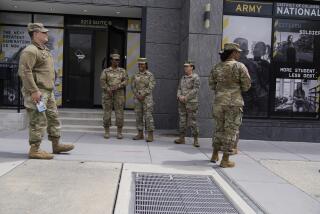Reservists Gain Duties, Benefits of the Regulars
- Share via
WASHINGTON — Reservists called up for active duty immediately become full-time military personnel with all the obligations and benefits of regular full-time service. In most cases, they must abandon their civilian jobs and relocate to military posts, disrupting families and careers.
Here are some frequently asked questions concerning the legal and professional ramifications of the reserve call-up authorized Wednesday by President Bush:
Question: What functions will reservists perform in the current crisis?
Answer: The initial deployment is expected to involve support personnel for specialized functions such as cargo handling, airlift, food and water handling, surface transportation, medical services, construction and intelligence. Personnel will be called from Army, Navy, Air Force and Coast Guard reserves. Some reserves will be transported to Saudi Arabia and other locations in the Middle East, but many will be assigned to positions at seaports and military bases within the United States.
Q: How long will reservists be assigned to active duty?
A: In the absence of a declaration of war, President Bush is authorized to call up as many as 200,000 reservists for up to 90 days, and he has the authority to extend the call-up for an additional 90 days. Individual reservists may be asked to serve for any part of that time, depending on the needs of the military. After the first 180 days, the President needs congressional authorization to continue the mobilization.
Q: Will reservists lose their regular jobs?
A: No. Under federal law, employers are required to reinstate reservists in their former jobs or in jobs of equivalent status and salary. Employers also are required to grant all promotions or salary increases that normally would have been granted during the period when a reservist is on active duty.
Q: Will reservists and their families forfeit job-related benefits, such as health insurance and pension plans?
A: No. Reservists who are called up for more than 31 days and their families receive immediate coverage under the military medical system. This includes care at all military medical facilities and health insurance under the Civilian Health and Medical Program of the Armed Services. The situation is more complex for other benefits, depending on each employer’s company policy. Federal law requires that reservists receive the same benefits accorded to other employees who take leaves of absence. This generally requires employers to continue making payments to employee pension plans, although there may be exceptions.
Q: How much are reservists paid?
A: Reservists receive the same salaries as full-time military personnel. Salaries are based on several factors, including rank, length of service, number of dependents and special service bonuses, such as overseas pay or combat pay. The base salary for a private with less than two years of service is $812 per month, or $9,744 per year. A major with 12 years of service receives a base salary of $3,073 per month, or $36,876 per year. Reservists are not compensated by the government for any shortfall between their military and civilian salaries, and private employers typically do not make up the difference.
Q: What if a reservist’s family finds it difficult to live on the military salary?
A: Families of reservists may be eligible for several forms of financial assistance, including food stamps and other federal programs as well as assistance provided through the Soldiers and Sailors Relief Act.
Q: Are reservists on active duty permitted to take home leaves?
A: Reservists receive the same leave benefits as regular military personnel, usually 30 days of vacation per year. All requests for leaves or vacations must be approved by the service.
Q: Are any reservists excused from a call-up, such as self-employed businessmen or physicians?
A: No. Reservists are expected to “keep their affairs in order” so they can be mobilized at a moment’s notice. Military officers screen reserve units periodically to ensure that members are able to serve if needed. Those who attain key positions within their communities are usually removed from the reserves.
More to Read
Sign up for Essential California
The most important California stories and recommendations in your inbox every morning.
You may occasionally receive promotional content from the Los Angeles Times.













